
Did you know that periodontal disease is the #1 problem affecting dogs and cats of all ages?
As a dog owner, you want to ensure your furry friend stays happy and healthy for as long as possible. However, did you know that periodontal disease is the most common problem seen in dogs, affecting a significant percentage of our canine companions? Just like in humans, poor dental hygiene can lead to a range of health issues for dogs, including tooth decay, gum disease, and even systemic health problems if left untreated. Fortunately, there are various methods available to combat plaque buildup and bad breath in dogs, ranging from traditional toothbrushing to natural DIY alternatives. In this blog post, we'll delve into the importance of canine dental care, explore the most effective methods for maintaining your dog's oral health, and provide insights into how you can incorporate these practices into your pet's daily routine. By prioritizing your dog's dental hygiene, you can decrease or prevent periodontal disease and keep your dog's breath fresh, and ensure they have overall healthy teeth.
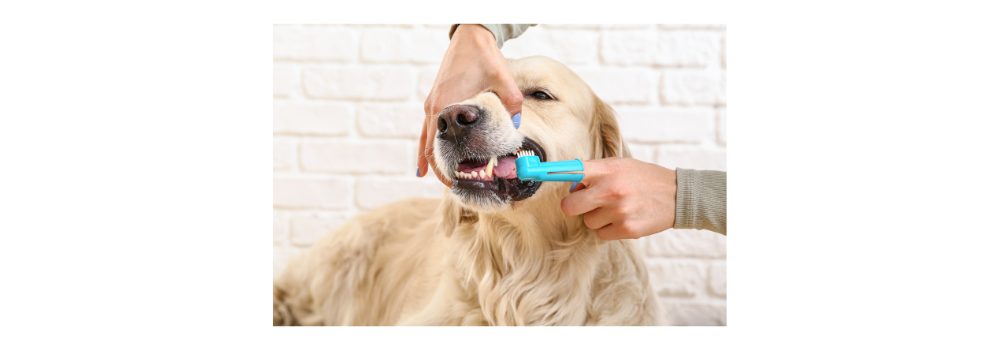
Maintaining your dog's oral health is vital for their overall well-being, and there are several options available to help decrease plaque and bad breath. Brushing your dog's teeth with a toothbrush and toothpaste designed for dogs is the most effective method. There are also alternative options, such as water additives and oral gels.
For those who prefer natural remedies, DIY toothpaste using ingredients like eggshell calcium, baking soda, and bentonite clay can provide a chemical-free approach to dental care. In this blog post, we'll explore the pros and cons of each method, as well as provide step-by-step instructions for making your own natural toothpaste for your furry friend. By incorporating these dental care practices into your dog's routine, you can help ensure their teeth stay clean, their breath stays fresh, and their overall oral health remains in top condition.
How often should I brush my dog's teeth?
Studies have shown that brushing at least every other day and preferably daily brushing is most efficacious.
What do vets recommend for brushing dogs' teeth?

The Veterinary Oral Health Council (VOHC), an entity of the American Veterinary Dental College (AVDC), awards its Seal of Acceptance to toothpaste products that successfully meet predetermined criteria for effectively controlling plaque and/or calculus deposition in dogs and cats. Toothpaste formulas approved by the VOHC undergo rigorous testing to demonstrate their efficacy in maintaining oral health in pets. These approved toothpaste typically contain ingredients that have been clinically proven to reduce plaque and tartar buildup, such as enzymatic agents like glucose oxidase or antibacterial compounds like chlorhexidine. By awarding its Seal of Acceptance, the VOHC provides pet owners with assurance that the toothpaste they're using meets high standards of effectiveness in promoting dental hygiene and health in their furry companions. Following VOHC-approved toothpaste recommendations ensures pet owners can confidently prioritize their pet's oral care and contribute to their overall well-being.
Several toothpaste products have received the Veterinary Oral Health Council (VOHC) Seal of Acceptance. Some of these toothpaste products include:
- CET Enzymatic Toothpaste
- Virbac CET Enzymatic Toothpaste
- Petrodex Enzymatic Toothpaste
- Maxi/Guard Oral Cleansing Gel
- Oxyfresh Pet Dental Gel
- Petsmile professional Virbac CET Enzymatic Poultry Flavor Dog & Cat Toothpaste toothpaste
These toothpaste products have undergone testing to demonstrate their effectiveness in controlling plaque and tartar buildup in dogs and cats, earning them the prestigious VOHC Seal of Acceptance. It's important to note that the list of approved products may evolve over time as new formulations are developed and undergo testing. Therefore, it's advisable to consult the official VOHC website or your veterinarian for the most up-to-date information on approved toothpaste products.
What is a good homemade toothpaste for dogs? DIY Toothpaste Recipe
I prepared a modified version of an eggshell calcium toothpaste from a study that showed it remineralized areas in humans with dentin hypersensitivity (1).
You can buy eggshell powder

Or make your own by rinsing the shells and baking them at 400 degrees for 20 minutes. Crush and grind them with a mortar and pestle to a fine powder.
Recipe
2 Tbsp eggshell powder
1/2 tsp baking soda
1-2 drops Peppermint oil
Combine the above in a wide-mouth container and mix well.
Brushing can be done by applying some coconut oil or water to a gauze, baby gum toothbrush, or soft-bristled toothbrush and putting a dab of the powder on the surface.
Best toothpaste for Both Dogs and Cats

An ADA-compliant soft-bristle, flat-head toothbrush is recommended.
You could also buy a kit such as the Virbac CET Enzymatic Poultry Flavor Dog & Cat Toothpaste that comes with a brush. It is an enzymatic toothpaste specifically formulated for dogs and cats to inhibit the formation of plaque and is an enzymatic dog toothpaste. Since it's great for both dogs and cats, you can use it in households with both dogs and cats. It does not have any foaming agents and can be swallowed.
Easiest No-Brushing Dog Toothpaste to Use
Healthy Mouth (TM) gel has the VOHC Seal of acceptance and is clinically proven to decrease plaque. It is 100% free of artificial or artificial ingredients.
Best for Puppies
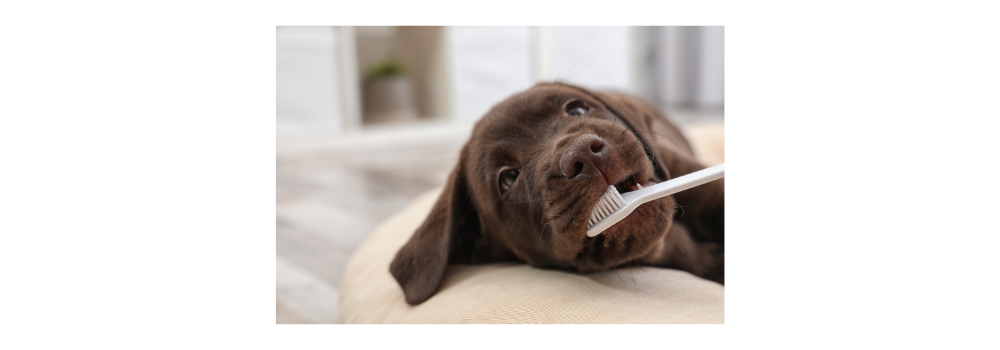
You should make your very best effort to introduce your puppy to touch around the mouth and eventually introduce them to a toothbrushing routine, as they will be more likely to allow non-anesthetic dental care/cleaning. It is difficult to perform a thorough cleaning on a cooperative dog, and much less so on a dog that does not allow its mouth to be touched, looked at, or allow tooth brushing. Don't fool yourself into thinking someone can do a good job with a dog like this!
Regarding Dental Care and Non-anesthetic Dental Cleaning

A well-behaved dog that has been accustomed to having teeth brushed would be more likely to accept having a cleaning, even under the gum line, much like a human child. It takes a dog whisperer to calm the dog and carefully proceed in scaling and polishing, but I would argue it can be done. Yes, it is ideal to anesthetize to ensure thorough cleaning and polishing, but it's not for every dog.
I am in the minority when I say that it is appropriate for some dogs. The VOHC does not approve of it, nor do a majority of veterinarians. I too was in that camp until I saw what some talented veterinary technicians can do with a cooperative dog.
Is human toothpaste safe for dogs?
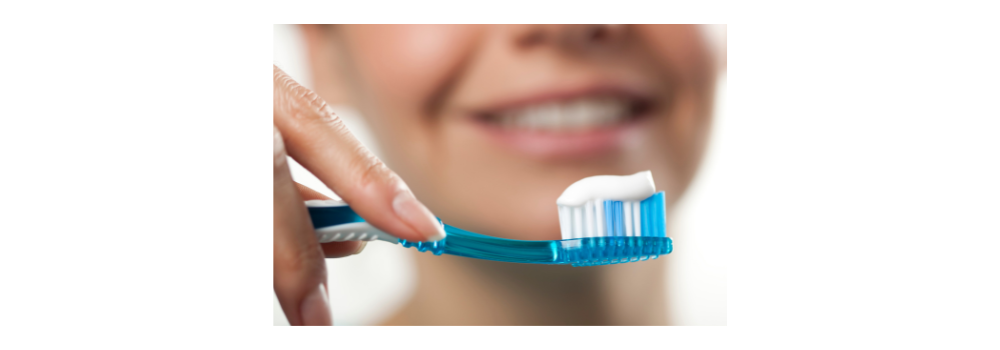
Using human toothpaste on a dog or puppy is generally not safe and can even be deadly if it contains xylitol. Human toothpaste often contains ingredients like fluoride, xylitol, and foaming agents, which can be toxic to dogs if ingested in large amounts. Additionally, dogs are unable to spit out toothpaste like humans can, so they end up swallowing a significant portion of it during brushing. This ingestion can lead to gastrointestinal upset or more severe health issues.
What can I use instead of dog toothpaste? Water additives
Dog dental health drinking water additives have both pros and cons when it comes to maintaining oral hygiene in dogs.
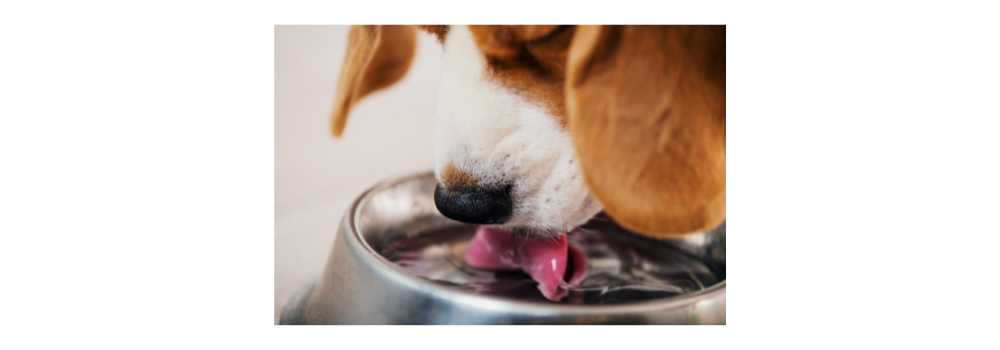
Pros:
- Convenience: Adding dental health additives to your dog's water bowl is an easy way to incorporate dental care into their daily routine without the need for brushing.
- Promotes Fresh Breath: Some dental additives contain ingredients like chlorhexidine or enzymes that help to combat bacteria in the mouth, reducing bad breath.
- May Inhibit Plaque Buildup: Certain additives claim to help inhibit plaque formation on teeth, which can contribute to better overall dental health.
- Suitable for Dogs Resistant to Toothbrushing: For dogs who are unwilling to tolerate toothbrushing, dental water additives can provide an alternative method of dental care.
Cons:
- This could potentially cause a dog to drink less water if they do not like the taste.
- Variable Effectiveness: While some additives may claim to prevent plaque buildup, their effectiveness can vary depending on the formulation and individual dog's dental health.
- Limited Contact Time: Unlike toothbrushing or dental chews, dental water additives have limited contact time with the teeth, which may limit their efficacy in removing plaque.
- Incomplete Dental Care: Dental water additives should not replace comprehensive dental care, including regular veterinary dental exams and professional cleanings.
- Potential for Allergy or Digestive Upset: Some dogs may have sensitivities or allergies to certain ingredients in dental water additives, leading to adverse reactions.
As for their efficacy in preventing tooth decay and inhibiting dental plaque buildup and bad breath, scientific evidence supporting the effectiveness of dental water additives in dogs is limited. While some products may show promise in reducing plaque and freshening breath, they are not a substitute for regular dental care practices recommended by veterinarians, such as toothbrushing, dental chews, and professional cleanings. Additionally, individual results may vary, and it's essential to consult with your veterinarian to determine the best dental care regimen for your dog's specific needs.
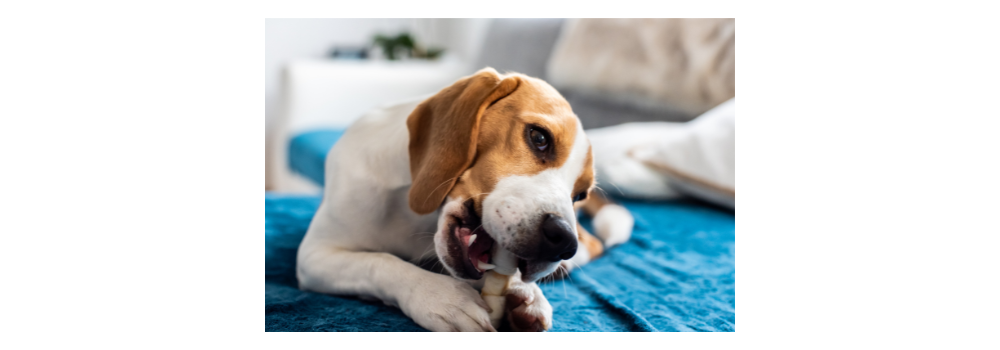
What can I use instead of dog toothpaste? Oral gels
There are several oral gels formulated specifically for dogs that can help decrease plaque buildup:
- Maxi/Guard Oral Cleansing Gel: This gel contains zinc ascorbate, which helps to reduce plaque and freshen breath. It can be applied directly to the teeth and gums or added to the dog's water bowl.
- TropiClean Fresh Breath Clean Teeth Gel: This gel features a blend of natural ingredients such as green tea extract and chlorophyll to help reduce plaque and tartar buildup while freshening breath. It is applied directly to the teeth and gums.
- Oxyfresh Pet Oral Hygiene Solution: This solution contains a blend of Oxygene and zinc acetate to neutralize bacteria and reduce plaque and tartar buildup. It can be added to the dog's water bowl daily.
- Pet King Brands Zymox Oratene Brushless Oral Care Gel: This gel contains enzymes to help inhibit harmful bacteria and reduce plaque and tartar accumulation. It is applied directly to the teeth and gums and does not require brushing.
- Virbac CET Enzymatic Oral Hygiene Chews: While not a gel, these dental chews contain enzymes that help break down plaque and tartar when chewed regularly.
When choosing an oral gel for your dog, it's essential to consult with your veterinarian to ensure it is suitable for your dog's specific needs and to follow the manufacturer's instructions for proper use. Additionally, regular veterinary dental check-ups and professional cleanings are important for maintaining your dog's oral health.
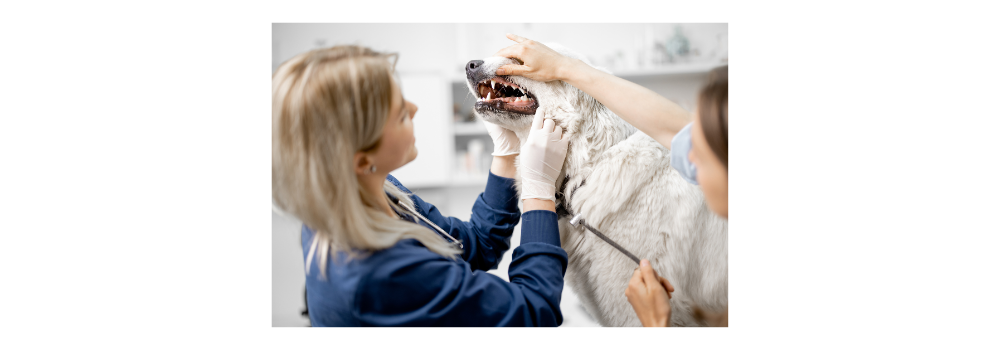
How do you remove plaque from a dog's teeth without a dentist?
Veterinary supervision is important even with non-anesthetic teeth cleaning. Any cleaning performed without a veterinarian's supervision is practicing veterinary medicine/dentistry without a license. Would you ever go to a "dentist" or a "hygienist" who did not have proper training and a degree? I'm pretty sure you wouldn't if you value your teeth.
There are plenty of arguments against non-anesthetic dental and with good reason. If not done properly an untrained person can damage tooth enamel, cause pain to an animal, and even injure or break fragile jaws. Some clinics can perform non-anesthetic cleanings competently. Do your research and see whether your dog is a candidate.

What if my dog licked toothpaste?
When in doubt, contact poison control. If the toothpaste contains xylitol, call: Animal Poison Control | (888) 426-4435
Reference
(1)Abou Neel EA, Bakhsh TA. An Eggshell-Based Toothpaste as a Cost-Effective Treatment of Dentin Hypersensitivity. Eur J Dent. 2021 Oct;15(4):733-740. doi: 10.1055/s-0041-1729676. Epub 2021 Aug 24. PMID: 34428838; PMCID: PMC8630962.
(2)Mayta-Tovalino F, Fernandez-Giusti A, Mauricio-Vilchez C, Barja-Ore J, Guerrero ME, Retamozo-Siancas Y. The Abrasive and Remineralising Efficacy of Coturnix Eggshell. Int Dent J. 2022 Dec;72(6):792-796. doi: 10.1016/j.identj.2022.06.029. Epub 2022 Sep 26. PMID: 36375894; PMCID: PMC9676544.










